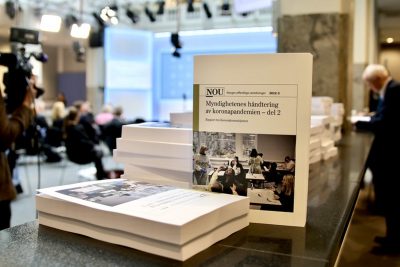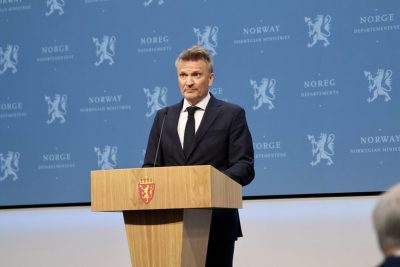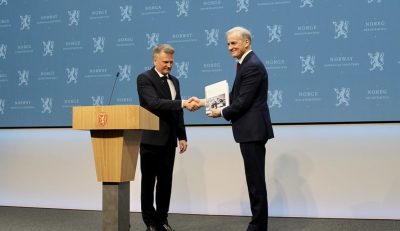A state commission set up to examine how Norway handled the Corona crisis has confirmed that Norwegian officials did well, but not quite good enough. Their goal is to learn how the country can be better prepared for the next pandemic.

“Things were carried out well,” commission leader Egil Matsen, a professor at NTNU in Trondheim and a former deputy leader of Norway’s central bank, said when delivering the commission’s final report on Tuesday. After Norway’s Conservatives-led government at the time all but shut down the country on March 12, 2020, most Norwegians followed all the rules and recommendations, the vast majority got vaccinated and Norway’s death rate was second-lowest in Europe, topped only by Iceland.
“The high level of confidence that Norwegians have in their leaders led to the population supporting infection prevention measures and to the high degree of vaccination (more than 90 percent),” Matsen said. He also noted that Norway suffered the least economic damage when compared to most other countries, thanks largely to government compensation programs and how it could dip into the country’s huge sovereign wealth fund.
“But there’s room for improvement,” Matsen added. Despite years of warnings that a pandemic could occur, the commission concluded that Norway wasn’t well-enough prepared. There was huge pressure on hospitals’ intensive care units and, not least, intensive care nurses. Local health care services struggled to comply with all the demands placed on them, and there wasn’t enough attention paid to the needs of children when schools had to be closed.

“It was a strength that the government involved itself and acted quickly, showing vigorous response throughout the pandemic,” Matsen said. At the same time, the commission believes, the government got bogged down in details and sometimes acted hastily. That “challenged its ability” to differentiate between the decisions the government had to legally make, and those “that should have been made at a lower level.”
Former Prime Minister Erna Solberg set up the commission just six weeks after the crisis began, with an eye to monitoring and evaluating the government’s response and learning how to be better prepared in the future. Commission members included doctors, lawyers, medical experts, local politicians and representatives of the military and business.
They delivered their first report a year later, on April 14, 2021, which centered on the overall lack of preparedness for a pandemic but hailed Norway’s resiliency. The second and final report delivered to new Prime Minister Jonas Gahr Støre on Tuesday concentrated on hospital and intensive care capacity, the response at the local government level and the work carried out to acquire vaccine and launch vaccination programs. Both reports only covered Corona response until November last year, and thus don’t evaluate the response under Støre’s new Labour-Center government. He has already announced, however, that a new commission will evaluate all Corona-related response since November 1.

Støre already has been indirectly criticized, however, since the former Left-Center coalition in which he served from 2005 to 2013 failed to respond to urgent warnings already then to increase intensive care capacity in Norway. Støre served as health minister himself just prior to that government’s defeat to Solberg’s in 2013. The commission noted that the first warnings of Norway’s lack of intensive care capacity came more than 20 years ago.
Solberg, meanwhile, disagrees that her government engaged in too much “detail steering,” claiming it speeded up decision-making. Things kept happening quickly, she noted, and her government had more authority than that found at the administrative levels of government. She understands how children, youth and students were hit hard by lockdowns, with many showing after-effects of the isolation caused by Corona.
EU and Sweden came to the rescue with vaccines
Solberg also acknowledged criticism over the lack of intensive care capacity, and how an attempt to assess it was halted by “political disagreement” over the sheer definition of intensive care. She noted, however, that more intensive care capacity wouldn’t have lessened the need for all the strict and invasive Corona containment measures that her government put in place.
Matsen also mentioned that Norway’s access to vaccine and ability to carry out well-run vaccination programs was thanks almost entirely to goodwill from EU officials in Brussels and assistance from Sweden. Norway is not a member of the EU and therefore had no right to secure allocations of the vaccine that the EU quickly secured through negotiations and purchase. Sweden, however, is a member of the EU, and shared the vaccine supplies from the EU that started arriving in late 2020. Without such generous assistance from the EU and Sweden, the Norwegian government would have had to negotiate directly with vaccine producers in competition with many other countries and, likely, purchase it at a higher price.
Norway is now mostly back to normal, even though the pandemic itself is not over on a global basis. China, for example, is back to the lockdowns and draconian measures of two years ago, and infection rates remain high in various other countries around the world. In Norway, Støre’s government has adopted a policy of learning to live with Corona, without restrictions. The Omicron variant has set off new waves of infection, but few people have become seriously ill in Norway and are back at work or school within four days or less.
newsinenglish.no/Nina Berglund

